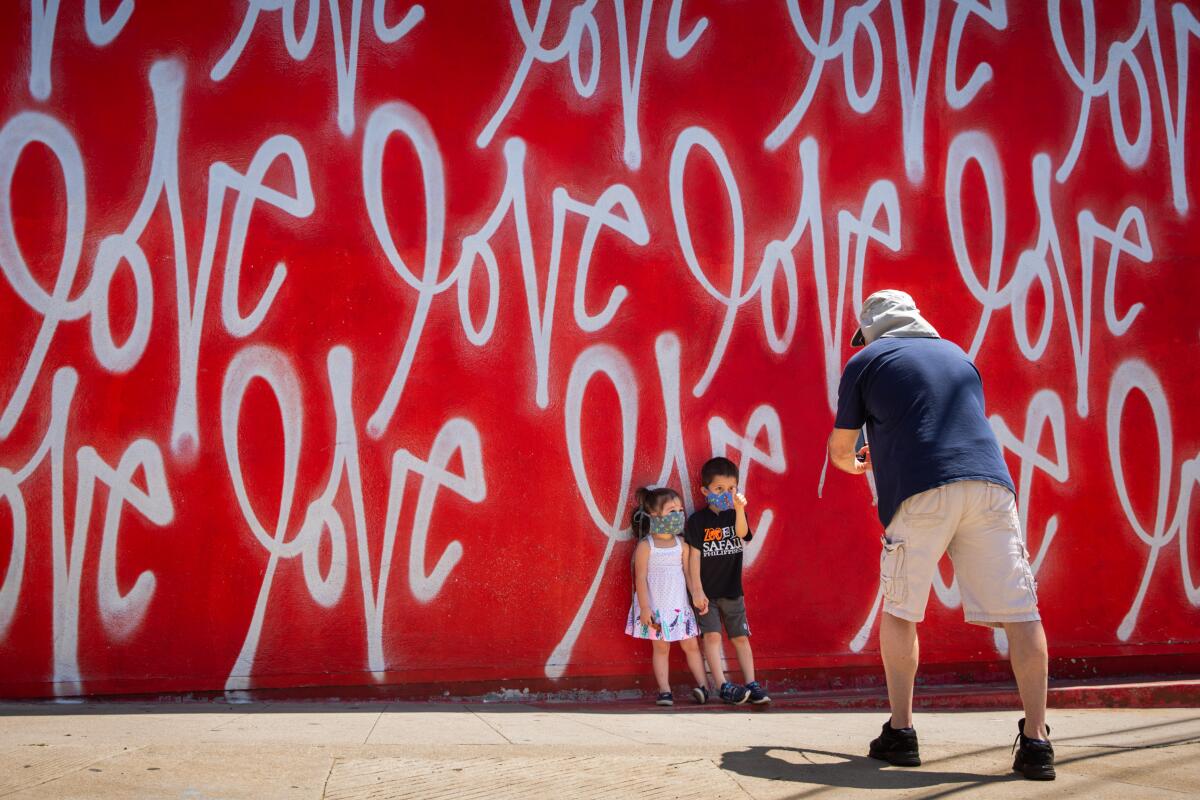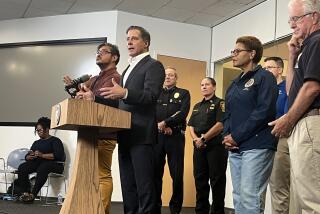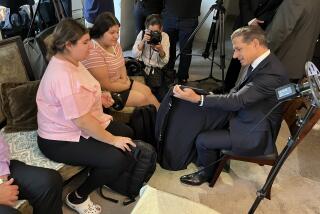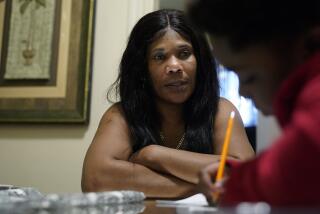We need to prepare for the mental health effects of coronavirus on kids

Four-year-olds have play dates through closed windows, sliding their toy cars in unison on either side of the glass. A high school student worries about his mother going to work in a food-packing warehouse, at risk for contracting COVID-19. Another teen says “there is nothing to look forward to,” as he tries to avoid sliding into depression. Worried parents are calling school district hotlines seeking help for their troubled children.
Experts say that when kids return to campuses, the demand for mental health care will be greater than the available services, as the effects of the coronavirus disruptions cut across societal strata, affecting children throughout California. But schools, the safe havens that provide the only access many children have to mental health care, are ill-prepared to support the magnitude of expected need.
“We’re only going through the first wave of the disaster,” said Dr. Curley Bonds, chief medical officer for the L.A. County Department of Mental Health. “This is the equivalent of people waiting on rooftops to be saved after Hurricane Katrina.”
Los Angeles schools chief Austin Beutner, who leads the nation’s second-largest school district, acknowledged the shortfall.
“We have an adequacy issue, and I could give you a long list of things where we are not able to provide the resources that should be provided in our public schools,” said Beutner, a persistent advocate for more school funding. “We do not have the sufficient number of counselors or social workers in our schools that we should.”
Why children will need more help
Not every child will experience the COVID-19 pandemic as a trauma, and some have already learned healthy coping skills, but many will experience loss if the disease has attacked their loved ones. Also, while secluded at home during the coronavirus outbreak, more children than usual may witness substance abuse, neglect, violence or abuse, experts said.
Because of this pandemic, “we’re going to see increased stress-related cognitive impairment and diseases” and probably increased toxic stress, said Dr. Nadine Burke Harris, California’s surgeon general.
Wide-ranging research has shown that children who face adverse childhood experiences have higher risk for worsening chronic diseases, autoimmune diseases, asthma, depression, anxiety and substance abuse deep into adulthood, Burke Harris said. At higher risk are children who have experienced untreated trauma before this outbreak.
California has been increasing efforts to train primary care providers to screen for such experiences, Burke Harris said. But now many of those reporters who help remove children from dangerous situations — teachers and trusted adults in school — are distant.
Even before the pandemic, the need was intense.
According to 2017-18 data from the National Survey of Children’s Health, a nationally representative survey of households with children, 7.1% of California respondents said their child had received counseling or treatment from a mental health professional in the last year, and 2% said their children needed mental health care but didn’t receive it. This translates to almost 200,000 children before the coronavirus crisis.
In California public schools last year, there were about 20,000 counselors, school psychologists, social workers and nurses — not all of whom are addressing mental health — for 6.1 million children. And schools expect massive budget cuts this year, making expanded counseling even more difficult to provide.
“The resources that we would need to be able to implement some of these interventions are more constrained,” Burke Harris said.
The American Federation of Teachers, one of the nation’s two major teachers unions, has called for more mental health resources at schools.
Students Deserve, a youth activism group based in the Los Angeles Unified School District, included in a list of requests “mental health support for trauma and setbacks from this period. We demand a permanent college counselor, PSW (psychiatric social worker), AND grief counselor at every school when schools reopen.”
Students need “a better support system” than their current one, which largely involves talking to one another rather than to mental health professionals, said Hamilton High School senior Asia Bryant.
L.A. County Office of Education Supt. Debra Duardo said schools will need to partner with local and county mental health departments and outside providers that can offer free services for students on campus.
How schools are preparing
The string of disappointments combined with isolation — no prom, no hanging out with friends, no athletic games or favorite activities — may also take an emotional toll. In 2013, researchers found that children who were quarantined for disease containment scored four times higher on a post-traumatic stress test than those who were not.
Schools are trying to start the work now to help students build resilience.
In the Las Virgenes Unified School District, student safety and wellness deans who used to deal largely with discipline referrals now provide check-ins and weekly support sessions for students who are grappling with being alone and being home, as well as parents and staff. The district also has begun training teachers in mindfulness and stress reduction, skills that mental health experts say will be important to fold in when students return.
L.A. Unified is running a mental health hotline staffed 12 hours a day open to students, parents and school employees during the week, though they won’t turn away anyone asking for help. Since April 1, the line has received about 660 calls, mostly from teachers and parents, many seeking resources and mental health aid for themselves or their children. The number for the L.A. Unified hotline is (213) 241-3840.
In Long Beach, officials are conducting check-in calls with students — not to replace counseling, said Long Beach Unified school psychologist Tom Sopp, but “to connect with students and express empathy. It’s a method to … monitor a student’s stress reaction.”
What should parents and students do now?
In the short term, Burke Harris said, parents and caretakers can try to maintain regular schedules for children as much as possible, pay attention to and ask about their feelings, and take care of themselves so their stress doesn’t affect the young ones in the household.
Families can also seek help from outside providers, some of which have agreements to provide services on school grounds.
Parents whose children have special needs, such as San Francisco Bay Area mother Isabella Brown, face additional challenges.
“It’s sometimes very difficult to talk him down from being very anxious and having really repetitive negative thoughts,” she said of her 16-year-old son, who is autistic. The break in routine and other disruptions worsened his anxiety. When he started to express suicidal thoughts, she said, she brought in a therapist.
Parents of little ones also have concerns about the abrupt changes. Lorena Taboas, 34, said her son Oliver Vengoechea can see his friends and attempt a play date only through the window of their Mar Vista home or while passing by in a car. Usually he’d be in a Spanish-speaking preschool in Culver City with a dozen other kids, growing his vocabulary and socializing. Now he largely entertains himself in the morning while his mother, a Univision producer, works remotely.
She is concerned about this isolation and the future return to a school. Right now Oliver seems fine — and mental health experts say many children will emerge from this crisis unharmed.
But a classroom setting is “going to be like a shock to him,” she said. “Is he going to be timid? Or is he going to be hyperactive? You don’t know how it’s going to affect them.”
Alejandro Silva, 17, a junior at a Camino Nuevo Charter Academy high school campus in Westlake, said mental health professionals shouldn’t wait for students to reach out to them while school is closed. He attended therapy at school for two years through an outside provider, which greatly helped manage his depression and anxiety, he said.
Now he relies on the tools he learned — writing; trying to find something productive to do, such as cooking, instead of staying in bed all day when he feels unmotivated; talking to friends often — to stave off a relapse.
“There’s nothing for me to look forward to during the day. I just overthink how everything is the same and there’s nothing new…. Sometimes I don’t really feel anything,” Alejandro said. “I’m kind of worried for how I’m going to deal with it all. I’m telling myself just go day by day, but I keep wondering how long is this? How long can I … be OK with this?”
If you or someone you know is feeling suicidal, call the National Suicide Prevention Lifeline at 800-273-8255. For the Disaster Distress Helpline, call 800-985-5990.
Times staff writer Deborah Netburn contributed to this report.
More to Read
Start your day right
Sign up for Essential California for news, features and recommendations from the L.A. Times and beyond in your inbox six days a week.
You may occasionally receive promotional content from the Los Angeles Times.







